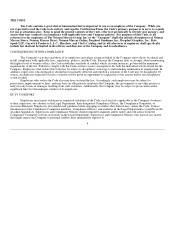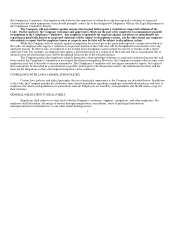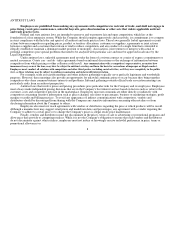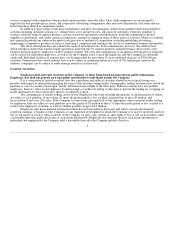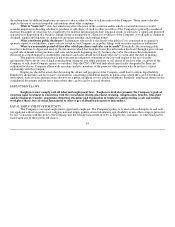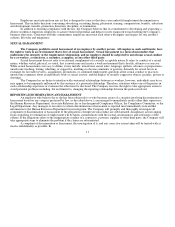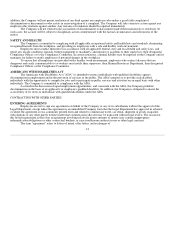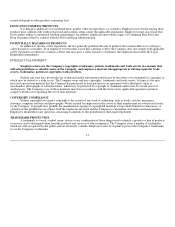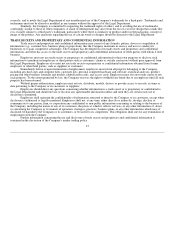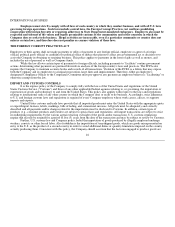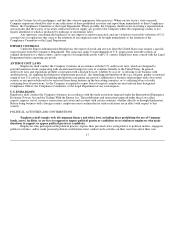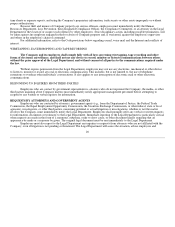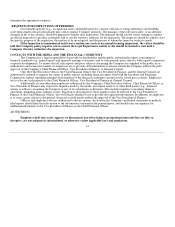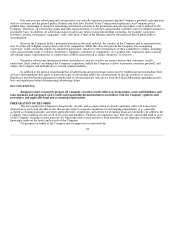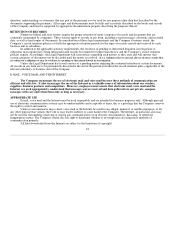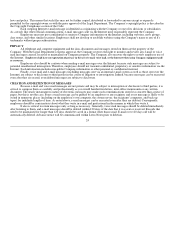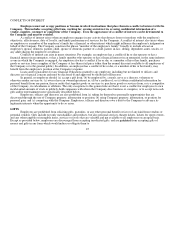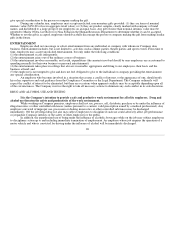Neiman Marcus 2002 Annual Report Download - page 153
Download and view the complete annual report
Please find page 153 of the 2002 Neiman Marcus annual report below. You can navigate through the pages in the report by either clicking on the pages listed below, or by using the keyword search tool below to find specific information within the annual report.
INTERNATIONAL BUSINESS
Employees must strictly comply with all laws of each country in which they conduct business, and with all U.S. laws
governing foreign operations. Such laws include control laws, the Foreign Corrupt Practices Act and laws prohibiting
cooperation with foreign boycotts or requiring adherence to State Department-mandated embargoes. Employees also must be
respectful and tolerant of the values and legally permissible customs of the communities and of the countries in which the
Company does or seeks to do business. Illegal activities are inexcusable, even if a particular community or country does not
enforce certain laws, and therefore does not penalize or censure violators of those laws.
THE FOREIGN CORRUPT PRACTICES ACT
Employees or their agents shall not make payments or offers of payment to any foreign official, employee or agent of a foreign
official, political party official or candidate for political office to induce that person to affect any governmental act or decision or to
assist the Company in obtaining or retaining business. This policy applies to payments in the form of gifts as well as money, and
includes the use of personal as well as Company funds.
While the law allows certain types of payments to foreign officials, including payments to "facilitate" routine government
actions, determining what payments are permissible involves analysis of the foreign country's laws and practices. The FCPA also
requires the Company to maintain accurate books and records of all transactions. Violation of the FCPA is a felony that may expose
both the Company and its employees to criminal prosecution, large fines and imprisonment. Therefore, either an employee's
designated Compliance Officer or the Compliance Committee must pre-approve any payment an employee believes is "facilitating" or
otherwise exempt from the law.
IMPORT AND CUSTOMS CONTROLS
It is the express policy of the Company to comply fully with the laws of the United States and regulations of the United
States Customs Service ("Customs") and those of any other applicable Federal agencies relating to, or governing, the importation or
exportation of goods and technology to and from the United States. This policy also applies with respect to the laws and regulations
relating to international trade of any other country in which the Company does or seeks to do business. Accordingly, strict adherence
to U.S. and foreign customs laws and regulations is required of every Company employee whose work causes, affects, or supports
imports and exports.
United States customs and trade laws provide that all imported goods must enter the United States with the appropriate quota
or export/import licenses, labels, markings, bills of lading, and commercial invoices. All goods must be adequately and correctly
described and all payments and/or charges related to the importation must be disclosed to Customs. In addition, certain types of
products (e.g., consumer products and textiles) are subject to special laws and regulations. All import transactions are subject to strict
recordkeeping requirements by the various agencies having oversight of the goods and/or transactions. U.S. customs regulations
require that records be retained for a period of five (5) years from the date of the transaction and may be subject to review by Customs.
Further, U.S. customs law and Company policy forbid the importation of goods produced by illegally employed underage
workers, convicts or other forced labor. Also forbidden is the importation of transshipped goods, which are goods misrepresented on
entry to the U.S. as the product of a second country in order to avoid additional duties or quantity limitations imposed on the country
actually producing them. Consistent with this policy, the Company should ascertain that the factories engaged to produce goods are
16


